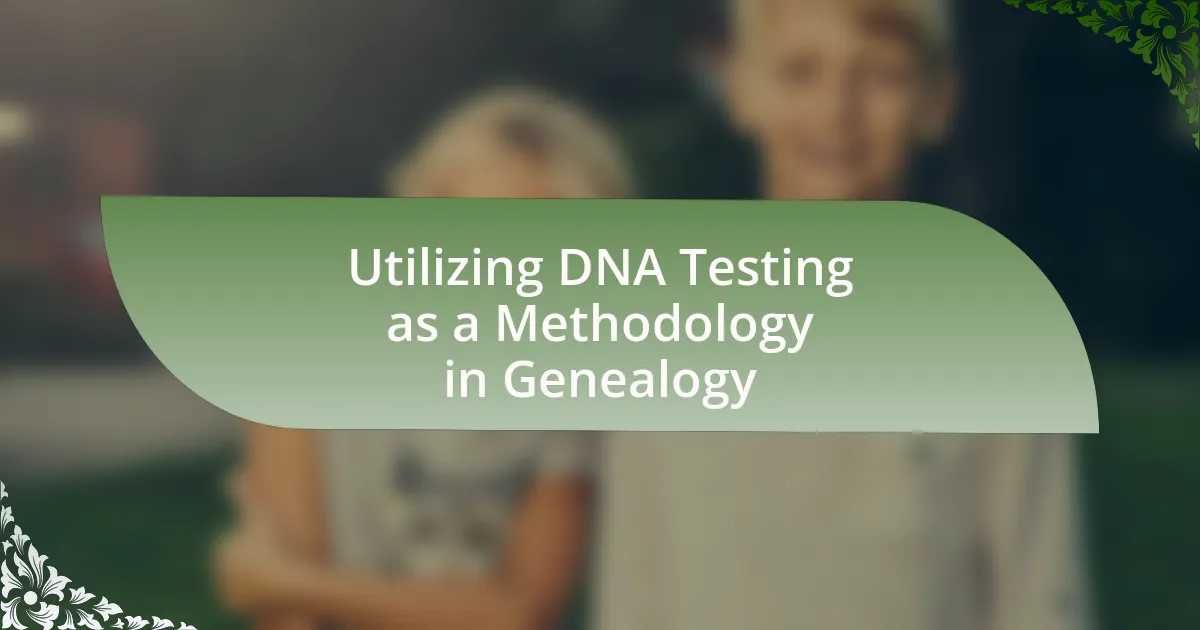The article focuses on the ethical considerations in genealogical research methodologies, emphasizing the importance of privacy, consent, and the potential for harm to individuals and families. It outlines key ethical principles such as respect for privacy, informed consent, and accuracy in representation, while addressing the ethical dilemmas genealogists face, including the challenges of sharing sensitive information and the implications of DNA testing. Additionally, the article discusses the impact of cultural sensitivities on ethical practices, the consequences of unethical research, and provides guidance on best practices and resources for maintaining ethical standards in genealogical research.
What are the Ethical Considerations in Genealogical Research Methodologies?
Ethical considerations in genealogical research methodologies primarily involve issues of privacy, consent, and the potential for harm to individuals and families. Researchers must ensure that they respect the privacy of living individuals by obtaining informed consent before sharing personal information. Additionally, genealogical research can uncover sensitive information that may affect family dynamics or reveal unexpected relationships, necessitating careful handling of such data to avoid emotional distress. The American Society of Genealogists emphasizes the importance of ethical standards in research practices, advocating for transparency and respect for the rights of individuals whose information is being utilized.
Why is ethics important in genealogical research?
Ethics is important in genealogical research because it ensures the respectful treatment of individuals’ personal information and family histories. Ethical guidelines help researchers navigate sensitive issues such as privacy, consent, and the potential emotional impact of revealing family secrets. For instance, the Association of Professional Genealogists emphasizes the necessity of obtaining informed consent when sharing personal data, which protects the rights of living individuals and their descendants. This adherence to ethical standards fosters trust between researchers and the communities they study, ultimately enhancing the integrity and credibility of genealogical research.
What ethical dilemmas do genealogists face?
Genealogists face several ethical dilemmas, primarily concerning privacy, consent, and the potential misuse of sensitive information. The challenge of balancing the desire to uncover family histories with the obligation to respect individuals’ privacy rights is significant, especially when dealing with living relatives or sensitive historical data. For instance, genealogists must navigate the complexities of sharing information that may affect the reputations or privacy of individuals, particularly when that information is not publicly available or when it involves sensitive topics such as adoption or criminal history. Additionally, the use of DNA testing raises ethical questions about consent and the implications of discovering unexpected familial relationships, which can lead to emotional distress for those involved. These dilemmas highlight the need for genealogists to adhere to ethical guidelines and best practices to ensure responsible research and reporting.
How can ethical considerations impact research outcomes?
Ethical considerations significantly impact research outcomes by ensuring the integrity, validity, and societal acceptance of the findings. When researchers adhere to ethical guidelines, they foster trust among participants and stakeholders, which can lead to more accurate data collection and analysis. For instance, studies that prioritize informed consent and confidentiality are more likely to yield honest and comprehensive responses from participants, thereby enhancing the reliability of the research results. Additionally, ethical lapses can result in public backlash, legal repercussions, or the invalidation of research, as seen in cases where researchers failed to protect participant privacy, leading to a loss of credibility and funding.
What are the key ethical principles in genealogical research?
The key ethical principles in genealogical research include respect for privacy, informed consent, and accuracy in representation. Respect for privacy mandates that researchers protect the confidentiality of living individuals and sensitive information. Informed consent requires that researchers obtain permission from individuals before using their personal data, ensuring that participants are aware of how their information will be used. Accuracy in representation emphasizes the importance of presenting genealogical findings truthfully and without bias, which is crucial for maintaining the integrity of the research. These principles are essential for fostering trust and ethical responsibility within the genealogical community.
How does informed consent apply to genealogical research?
Informed consent is crucial in genealogical research as it ensures that individuals understand and agree to the use of their personal and familial information. This ethical principle protects participants’ autonomy and privacy, requiring researchers to provide clear information about the purpose, methods, and potential impacts of the research. For instance, when collecting DNA samples or family histories, researchers must obtain explicit consent from participants, ensuring they are aware of how their data will be used and shared. This practice aligns with ethical guidelines established by organizations such as the American Society of Human Genetics, which emphasizes the importance of informed consent in genetic research to safeguard individuals’ rights and maintain trust in the research process.
What role does confidentiality play in genealogical methodologies?
Confidentiality is crucial in genealogical methodologies as it protects sensitive personal information of individuals involved in family histories. By ensuring that data about living individuals is kept private, genealogists uphold ethical standards and respect the privacy rights of those whose information is being researched. This practice is supported by guidelines from organizations such as the Association of Professional Genealogists, which emphasizes the importance of confidentiality in maintaining trust and integrity within the field.
How do cultural sensitivities influence ethical practices in genealogy?
Cultural sensitivities significantly influence ethical practices in genealogy by shaping how researchers approach the collection, interpretation, and sharing of ancestral information. Different cultures have unique beliefs regarding ancestry, privacy, and the significance of family history, which can dictate what is considered respectful or intrusive. For instance, some Indigenous communities may have specific protocols for sharing genealogical data, emphasizing the need for consent and collaboration with community leaders. This respect for cultural norms ensures that genealogical research does not exploit or misrepresent individuals’ histories, thereby fostering trust and ethical integrity in the research process.
What are the implications of cultural heritage on genealogical research?
Cultural heritage significantly influences genealogical research by shaping the context and interpretation of family histories. It provides essential insights into the customs, traditions, and historical narratives that inform an individual’s ancestry. For instance, understanding cultural practices can help researchers identify relevant records and oral histories that may not be documented in conventional genealogical sources. Furthermore, cultural heritage can affect the ethical considerations in genealogical research, as it necessitates sensitivity to the values and beliefs of different communities. This is particularly important when dealing with indigenous populations or marginalized groups, where historical injustices may impact the way genealogical information is perceived and shared.
How can genealogists respect cultural differences in their methodologies?
Genealogists can respect cultural differences in their methodologies by incorporating culturally sensitive practices and understanding the historical contexts of the communities they study. This involves actively engaging with community members, recognizing diverse cultural norms regarding privacy and data sharing, and adapting research methods to align with these values. For example, genealogists should be aware that some cultures may have specific rituals or taboos surrounding ancestry and family history, which can influence how information is shared or recorded. By prioritizing these cultural considerations, genealogists can foster trust and collaboration, ensuring that their research is respectful and ethically sound.
What are the potential consequences of unethical genealogical practices?
Unethical genealogical practices can lead to significant consequences, including the violation of privacy rights and the potential for misinformation. When genealogists fail to obtain informed consent from individuals whose data is being used, they infringe upon personal privacy, which can result in legal repercussions and loss of trust within communities. Furthermore, the dissemination of inaccurate or misleading genealogical information can distort family histories, leading to emotional distress for individuals and families who may uncover false narratives about their ancestry. This misinformation can also perpetuate stereotypes and biases, impacting societal perceptions of certain groups.
How can unethical practices affect individuals and families?
Unethical practices can severely impact individuals and families by causing emotional distress, eroding trust, and leading to potential legal consequences. For instance, when genealogical researchers falsify data or misrepresent family histories, individuals may experience confusion about their identity and heritage, which can strain familial relationships. Additionally, unethical practices can result in the unauthorized sharing of sensitive personal information, exposing families to privacy violations and potential exploitation. Research indicates that trust is a fundamental component of family dynamics; when that trust is compromised through unethical actions, it can lead to long-lasting psychological effects and familial discord.
What legal ramifications can arise from unethical genealogical research?
Unethical genealogical research can lead to several legal ramifications, including invasion of privacy, defamation, and potential violations of data protection laws. Invasion of privacy occurs when researchers disclose sensitive personal information without consent, which can result in lawsuits. Defamation may arise if inaccurate information is published about individuals, damaging their reputation. Additionally, many jurisdictions have data protection regulations, such as the General Data Protection Regulation (GDPR) in the European Union, which impose strict guidelines on handling personal data; non-compliance can lead to significant fines and legal action. These legal consequences underscore the importance of ethical practices in genealogical research.
How can genealogists ensure ethical compliance in their research?
Genealogists can ensure ethical compliance in their research by adhering to established ethical guidelines and best practices. These guidelines include obtaining informed consent from living individuals before sharing their personal information, respecting privacy and confidentiality, and accurately representing the sources of their information. For instance, the Association of Professional Genealogists (APG) emphasizes the importance of transparency and integrity in genealogical research, which reinforces the need for genealogists to document their sources and provide proper attribution. By following these ethical standards, genealogists can maintain the trust of their subjects and the integrity of their research.
What best practices should genealogists follow to maintain ethical standards?
Genealogists should adhere to best practices such as obtaining informed consent from living individuals before sharing their personal information. This practice respects privacy and autonomy, ensuring that individuals are aware of how their data will be used. Additionally, genealogists should verify the accuracy of their sources and provide proper citations to maintain transparency and credibility in their research. The Genealogical Proof Standard emphasizes the importance of thorough research, which includes corroborating evidence and considering the reliability of sources. By following these practices, genealogists uphold ethical standards and contribute to the integrity of genealogical research.
How can genealogists stay informed about evolving ethical guidelines?
Genealogists can stay informed about evolving ethical guidelines by actively engaging with professional organizations and resources dedicated to genealogy ethics. Organizations such as the Association of Professional Genealogists (APG) and the National Genealogical Society (NGS) regularly update their ethical standards and provide educational materials. Additionally, subscribing to relevant journals, attending conferences, and participating in workshops can enhance awareness of current ethical practices. These methods ensure genealogists remain knowledgeable about the latest developments and best practices in ethical research methodologies.
What resources are available for understanding ethical considerations in genealogy?
Resources available for understanding ethical considerations in genealogy include academic journals, books, and online courses. Notable academic journals such as the “Journal of Genealogy and Family History” publish articles that explore ethical dilemmas faced by genealogists. Books like “Genealogy and the Law: A Guide to the Legal Issues of Genealogy” by Thomas W. Jones provide insights into legal and ethical frameworks. Additionally, organizations like the Association of Professional Genealogists offer webinars and guidelines that address ethical practices in genealogical research. These resources collectively help genealogists navigate the complexities of ethical considerations in their work.
Where can genealogists find ethical guidelines and frameworks?
Genealogists can find ethical guidelines and frameworks through professional organizations such as the Association of Professional Genealogists (APG) and the National Genealogical Society (NGS). These organizations provide resources, including codes of ethics and best practices, that outline the responsibilities of genealogists in their research. For example, the APG Code of Ethics emphasizes integrity, respect for privacy, and the importance of accurate reporting in genealogical work. Additionally, the NGS offers educational materials that address ethical considerations in genealogical research methodologies, ensuring that genealogists adhere to established standards in their practice.
What organizations provide support for ethical genealogical research?
Organizations that provide support for ethical genealogical research include the Association of Professional Genealogists (APG), the National Genealogical Society (NGS), and the International Society of Genetic Genealogy (ISOGG). These organizations promote ethical standards, provide resources, and offer guidance on best practices in genealogical research. For instance, the APG has a code of ethics that emphasizes the importance of accuracy and respect for privacy, while the NGS offers educational materials that address ethical considerations in research methodologies.
What practical tips can genealogists implement to uphold ethical standards?
Genealogists can uphold ethical standards by obtaining informed consent from living individuals before sharing their personal information. This practice ensures respect for privacy and autonomy, which are fundamental ethical principles in research. Additionally, genealogists should verify the accuracy of their sources and provide proper citations to maintain transparency and credibility in their work. By adhering to these practices, genealogists not only protect the rights of individuals but also contribute to the integrity of genealogical research as a whole.




